- Home
- Peter Grainger
Songbird Page 2
Songbird Read online
Page 2
Waters knew that Reeve would still be standing by Terek’s desk. Then the detective inspector said, ‘She’s coming out with me, we’ll be leaving shortly. And she’s making you crime scene manager on this one.’
And that, he told himself as he walked back along the footpath towards where he had parked his car, is a serious responsibility. It means that if anyone is charged and the case comes to court, every aspect of how the crime scene was investigated will come under the closest public scrutiny. One error, one omission, and the guilty might walk free. One error, one omission, and you are marked forever as someone who cannot handle that sort of pressure.
It was the younger of the two uniformed officers who had come back to the beginning of the footpath. The tape was already in place across it, and the officer stood on the other side – it was too low for Waters to duck his six feet something under it, so he lifted over first one leg and then the other. They stood together and Waters told him that he was now managing the crime scene, and he’d need to know their names and exactly what each of them had done since they arrived. On his own, this uniformed man was friendly and cooperative, and he told Waters he was the one who had approached the body closely and established that there was no sign of life – Waters had assumed it would have been the older, more experienced officer.
‘I checked her wrist and her throat but she was cold. I’d say she’s been dead a good few hours, sir.’
‘I agree. Have you turned anyone back yet?’
‘No. But it won’t be long. This is a busy old path in the summer.’
‘I’m just wondering whether we could get the names and details of anyone who walks the path every day, you know, the dog walkers and such? Anyone who went along here yesterday evening might be worth speaking to at some point. Would you mind asking them about that, and passing anything interesting on to me?’
Not at all, said Police Constable Steve Hannam, and if anyone had anything really useful, he’d hold them by and send for the detective straight away. Waters thanked him and said reinforcements from Hunston were on their way – then he headed for his car and his notepad, relieved that not every uniform in west Norfolk had some sort of a grudge against young upstarts in suits.
He had turned the notepad so the pages were landscape instead of portrait, and he had drawn grids as neatly as he could freehand. There are, naturally, proper proformas for all this, but no one had told him when he left the station last night that he would be managing a crime scene tomorrow morning. If he’d had the PDFs on his iPad, even better, but he didn’t for the same reason. He recalled as much as he could and would transfer what he was collecting now as soon as he was back in Kings Lake Central.
He wrote “PC Steven Hannam” and then stopped and wondered whether it was a “ph” instead of a “v”. Presumably a defence counsel wouldn’t be able to make too much of that… Then he noted down that Hannam had touched the body in two places to ascertain that the woman had no pulse; Hannam’s prints would be on his personnel file for the purposes of elimination in these situations. Waters made sure every significant time had been recorded, before filling in spaces in the left-hand column with the roles of those he knew would soon be here – “SOCO”, “Photographer”, “Doctor” and so on. He added columns that would show the times of arrival and departure for everyone who would be involved.
When all that was done, he went to the boot of his car and opened it. Months ago, he had put a full plastic overall into his car, just in case, never imagining the day would come. He found it in its cover, wedged down in the space beside the spare wheel. As crime scene manager, should he be wearing this? The absurd realisation came that he was worrying about appearing over-dressed at a murder scene. Waters concluded that he himself was one of the people who needed to be kept away from the body, however, and the plastic covers over his shoes would do for now.
And it was going to be hot again, you could feel it in the air already. That would be a factor in the management of the case today – the processes of putrefaction begin earlier and take place much more rapidly in high temperatures. He frowned as he took off his jacket, trying to order his professional thoughts and his personal ones at the same time. Yesterday the victim had been a living individual, breathing, moving, interacting with others that she knew, making plans for tomorrow, and now she was a corpse beginning to decay as the sun rose in the sky on that tomorrow.
Murder is theft of the most precious thing we ever own, and all crimes in the end are brought about by selfishness. Our job is to make sure that the selfish are brought to justice as a lesson to the rest of us – if we fail in that, the world begins to spin off its axis. So, no pressure, then, sir!
Waters put the plastic overall back into the boot and closed it. He could hear a vehicle approaching through the caravan park, the gears changing as it moved quickly through the ninety-degree bends. Squinting up at the sun, he thought, it’s going to be hotter than ever. Then he took off his tie as well and put it with the jacket onto the passenger seat of the car, hanging the lanyard with his ID around his neck. If he’d wanted to wear a suit all day, he could have become an accountant and earned more money. The thought and the actions had given him an unexpected lift, a little burst of confidence. This might prove to be reckless but sometimes one must live dangerously – especially when you have just looked into the sightless eyes of death.
When he got back to Steve Hannam, the police BMW was just parking up. Two uniformed officers, a man and a woman, got out and came towards them. Waters took their names and explained what he wanted them to do. They followed him back along the footpath to where it was closest to the body and positioned themselves twenty yards either side of that point, in case anyone managed to avoid the areas already taped off. Then, notepad in hand, he set off to interview the older officer, the one who’d said “Look up, the suits have arrived.” If his attitude hadn’t improved a little, the crime scene manager could probably make sure he was the last to leave.
Chapter Three
‘I’m sorry, I’m not very good with names and I’ve forgotten yours already. But of all the days, and at this unearthly hour as well. It’s not good enough. And my daughter’s getting married tomorrow…’
The photographer put out his arm again, which was a signal for Waters to stop moving while another image of the footpath was taken. Then the man shambled forward again, lens cases swinging from the specialist’s utility belt that barely managed to meet around his middle.
‘Detective Sergeant Waters. Congratulations are in order, then. Is it a big wedding?’
‘It had better be, the amount it’s costing me. Primitive bloody tradition.’
‘Marriage?’
‘Yes, that as well, but I was referring to the fact that the bride’s father is expected to pay for most of it. Not the bride’s mother. She just flies in from Florida the day before – today –’ with a dark look at Waters as if he really was in some way responsible for the timing of this – ‘plays a leading role in the emotional feeding frenzy over one weekend, and then flies off back to The Sunshine State. Marvellous, eh?’
Plainly this was a rhetorical question but Waters felt compelled to make another effort to interact with this fellow professional.
‘So, who is the lucky man?’
‘Philosophy lecturer. An idiot with three degrees, no money and even less common sense. Is this the spot?’
The photographer had seen the female police officer on the footpath ahead of them. Waters explained that it was another twenty yards beyond her, and Gervaise Fraser seemed to take this as another personal insult. He waddled on past the woman without a good morning, and Waters made a half-apologetic gesture on his behalf before following. It would be easy to dismiss the man but Waters had not forgotten the shovel in the grass at Lowacre, the shovel that had mysteriously appeared several days after the murder of Mark Randall. The morning it was found, Smith had specifically asked for Gervaise Fraser to photograph the scene if he was available.
‘
Right, I can see it now. Stand aside unless you want to be in this, sergeant. Video record of the approach and the measures you’ve taken to protect the scene.’
Fraser held up a miniature video camera, little bigger than an iPhone, and swung it slowly through a hundred and eighty degrees, ending with the faint but now unmistakable pathway that led towards the body.
‘Done. Now I suppose I’d better take some protective measures myself. Help me with these damned things, would you?’
He was referring to foot coverings like the ones Waters was still wearing from his previous visit to the crime scene – Fraser had a set in his right hand. There was nowhere for him to sit, and he had considerable difficulty when he attempted to bend forward so that he could slip them over his shoes. In the end, he balanced alternately on one leg, a hand on the detective’s shoulder while Waters pulled on the covers.
‘Thank you. I’m hoping that soon they’ll declare me medically unfit for this. Right, in we go. Follow me, please.’
Fraser switched on the video again, and moved slowly towards the body. Waters had an interest in photography and he recognised the manufacturer’s name on the DSLR that Fraser was holding in his other hand now, but the model was far more sophisticated than anything he owned himself. Every shot taken was a potential item of evidence, and not only for the prosecution – defence lawyers have the right to see each one, whether used in evidence or not, and so every image had to be documented. Waters tried to keep count but soon gave up. Digital time and date-stamping mean that ensuring a full record has been kept is a relatively straightforward matter nowadays.
Fraser worked silently, methodically and surprisingly quickly. He took pictures of the body from all four sides before moving in to make close-ups of the obvious things – the bruised face and throat, her hands and feet, the tears around the buttons of her blouse. Only when the camera moved close to her exposed private parts did Waters feel his stomach turn over a little. This was necessary but it still felt intrusive; then he remembered how much more intrusive things would become when she lay on the metal table in the police mortuary and Dr Robinson picked up the first of his instruments from the tray that Olive Markham had prepared for him.
For a moment, Waters had forgotten the notepad in his hand. Then he flipped to a new page and wrote down the time the photography had begun. On the same page, he drew a quick sketch of the scene with a rounded oblong at the centre to represent the body, followed by an arrow to show the direction of travel as Fraser worked his way around the victim. There was no back-tracking to get a different shot, and not a single unnecessary footstep. Waters realised two things then – one, he was watching an expert at work, and two, Smith had come to the same conclusion years ago.
The entire business had taken little more than ten minutes. When Fraser finally straightened up, he looked briefly like a different man; the short temper and gruff manner had been replaced by something more reflective and quiet. He wasn’t exactly smiling but…
Fraser looked down at her again, and then up at Waters.
‘Strangled?’
It wasn’t really a question – the photographer must have seen plenty of such victims in his time.
Waters said, ‘It looks like it.’
Then Fraser twisted the lens away from the front of the camera and slipped it into a case. From another pocket, he took out a cap and covered the dark, circular space. Somewhere inside, on a computer chip, were stored the patterns of pixels that had recorded the place where a life had come to its end, and what remains of us when that has happened.
The sun was shining on the dead face, the eyes surely more cloudy now than when he had arrived. As he looked down at that, Waters saw a fly buzzing around her. He half-stooped and waved a hand to brush it away.
Fraser said, ‘SOCO will be here soon. They’re never far behind me in these cases.’
Waters nodded, and then Fraser looked about him at the silent forest of Scots pines on one side and the gentle rise of the dunes on the other, as if he had just noticed the place for the first time. A few yards away from the woman’s head there was a stand of rosebay willowherb, the brilliant red and purple flowers already busy with bees. The photographer raised a hand to all this and then the blue sky before he said in a different voice, ‘Well, this makes a change!’
Waters said, ‘What does?’
‘The beautiful light,’ Fraser said, patting the camera as he turned away.
He held the tape as high as possible so Fraser could duck beneath it, and then he saw DCI Reeve’s Audi coming to a halt a little way down the road. Waters couldn’t see who was in the passenger seat but guessed it would be DI Simon Terek. Had the question already arisen as to whether DCI Cara Freeman’s murder squad would take this one? There hadn’t been a single unlawful killing since the unit had been officially formed in February, much to the disgust of Serena Butler – the same Serena Butler who was now a member of his own team, and who would be reporting for duty at Kings Lake Central in – he checked on his phone – about thirty minutes’ time. He would get a call in about thirty-five minutes, therefore, five minutes being the time it would take for her to hear about this one.
Gervaise Fraser arrived at his own vehicle, an early model Range Rover, and opened the rear door. Then Reeve got out of her car and went to speak to him – perhaps she was checking with him that the crime scene was being properly controlled. Simon Terek appeared at the same time and made for where Waters was waiting with PC Steve Hannam.
Before he arrived, Waters asked whether any walkers had been turned back from the footpath yet, and Hannam said a party of four had been – they were long-distance ramblers with maps and all the gear, not local people. He’d given them the choice of going up and through the town or out along the beach as the tide was out, and they had chosen the latter course. They hadn’t asked many questions, Hannam said, but it wouldn’t be long before it was out on social media that something was going on down at Pinehills.
Terek was here now, saying good morning to the two of them, and asking whether there had been any developments since they last spoke on the phone. As ever, he was meticulously groomed; this morning’s suit was a light grey without a stripe, and even the gold-rimmed glasses looked as if they had been thoroughly polished before he’d set off for the station at Kings Lake. Waters reported what had been done so far, and Terek said, ‘Good. You certainly look as if you’ve been busy!’
There was a just a glance at Waters’ open shirt collar and the absence of a jacket.
Then Reeve was approaching, and Waters couldn’t help noticing what she was wearing, as a result – a dark grey, pin-striped, single-breasted blazer over a white blouse and a matching skirt. Good to know everyone was making an effort to dress for the occasion.
At least she managed to make her good morning more convincing than Terek’s, and she took the time to thank Hannam for getting here so promptly, before she said, ‘The photographs are being uploaded as we speak. It will take a few minutes but we should have access to them before long. How far from here to the body, Chris?’
‘One hundred and fifty metres or thereabouts, ma’am.’
It might be slightly more – he knew his own stride length and had counted them back to here when he accompanied Gervaise Fraser just now.
‘OK…’
She folded her arms and thought for a moment.
‘Right, we’re not going there until SOCO have been over it. No need to risk any further impact on the scene, and we know they’ll be here soon.’
To Terek she said, ‘Let’s make a start with the people who run this caravan park. The woman could have come from anywhere but it makes sense to begin here.’ Then she looked at her watch and said, ‘Gone seven thirty, there should be someone about by now. Do we know where the office is?’
Waters said that he did, on the left near the main gate, and he wanted to mention the shoes again, the high heels, but Terek had already been told that, so it was up to him now, assuming he hadn’t forgot
ten it. Instead, Waters added that he’d stayed here on the caravan site a couple of times; then Terek looked surprised and said, ‘Really?’, as if he had expected better of a sergeant on his team.
Reeve must know about Smith’s caravan, but perhaps she didn’t know exactly where it had been sited – she wasn’t showing any sign that she had connected the dots yet. Instead, she said, ‘God, it’s going to be hot again,’ and took off her jacket, draping it over her left arm. And the thing is, once you’ve trained your eyes to see, you see everything – in the crook of her left elbow, Waters saw the bruising and the little circular plaster that covered the place where a blood sample had been taken.
She said, ‘Do you know the owners of the site or the manager, Chris?’
‘Yes, ma’am, if it hasn’t changed hands. It’s the same person, a Mrs Salmon.’
‘Right, that’s a start,’ and he wondered whether she might take him along and leave Terek in charge of the Norfolk countryside. Managing a crime scene was good experience, but talking to live people was preferable to standing guard over dead ones. He waited, and she seemed to be considering it, and then her phone buzzed with a text. Reeve took it out, read it and smiled.
‘SOCO have got lost – Satnav failure. They just called Lake for directions. Wouldn’t exactly fill the general public with confidence, would it? We’ll go to the office and leave them in your capable hands, Chris, assuming they don’t end up in Cromer.’
Her mobile was still in her hand when it began to ring.
She said, ‘Here we go. It’s going to be a busy morning. DCI Reeve speaking.’
Waters thought he recognised the female voice on the other end – if he was right, it hadn’t taken Serena Butler as long as he’d thought to get herself involved. Reeve listened and then said, ‘Alright, could well be. Text me that name straight away, please.’
She ended the call before saying, ‘Serena. A few minutes ago, Hunston had a call from a woman saying her sister didn’t come home last night. Only it isn’t exactly home because they’re on holiday. Guess where they’re staying?’

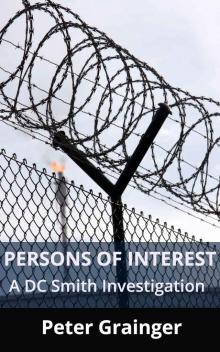 Persons of Interest
Persons of Interest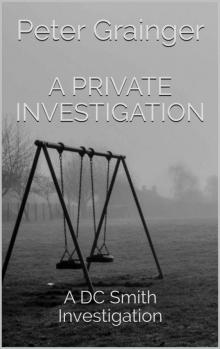 A Private Investigation
A Private Investigation Songbird
Songbird On Eden Street
On Eden Street An Accidental Death
An Accidental Death Time and Tide
Time and Tide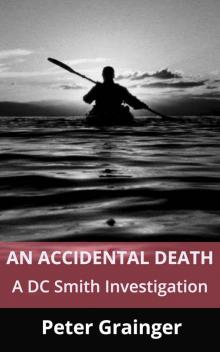 An Accidental Death: A DC Smith Investigation
An Accidental Death: A DC Smith Investigation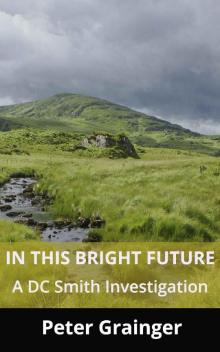 In This Bright Future
In This Bright Future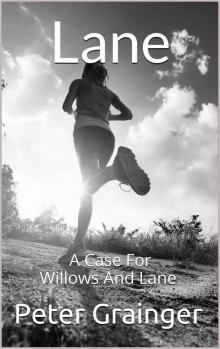 Lane: A Case For Willows And Lane
Lane: A Case For Willows And Lane The Rags of Time: A DC Smith Investigation
The Rags of Time: A DC Smith Investigation Luck and Judgement
Luck and Judgement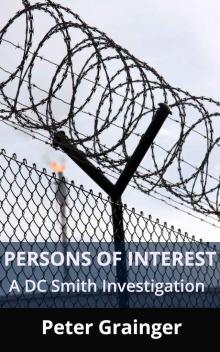 Persons of Interest: A DC Smith Investigation
Persons of Interest: A DC Smith Investigation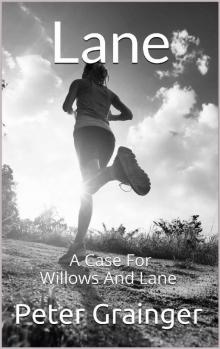 Lane
Lane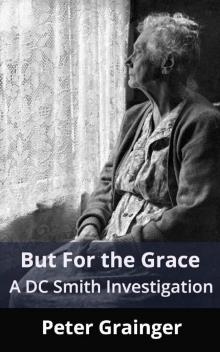 But For The Grace
But For The Grace Time and Tide: A DC Smith Investigation
Time and Tide: A DC Smith Investigation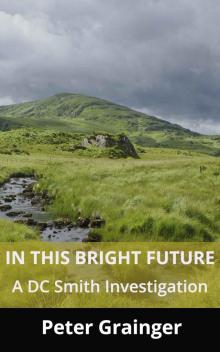 In This Bright Future: A DC Smith Investigation
In This Bright Future: A DC Smith Investigation The Rags of Time
The Rags of Time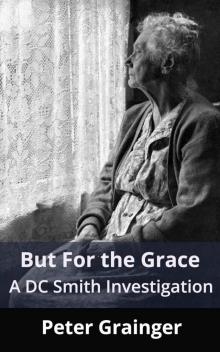 But For The Grace: A DC Smith Investigation
But For The Grace: A DC Smith Investigation Luck and Judgement: A DC Smith Investigation
Luck and Judgement: A DC Smith Investigation